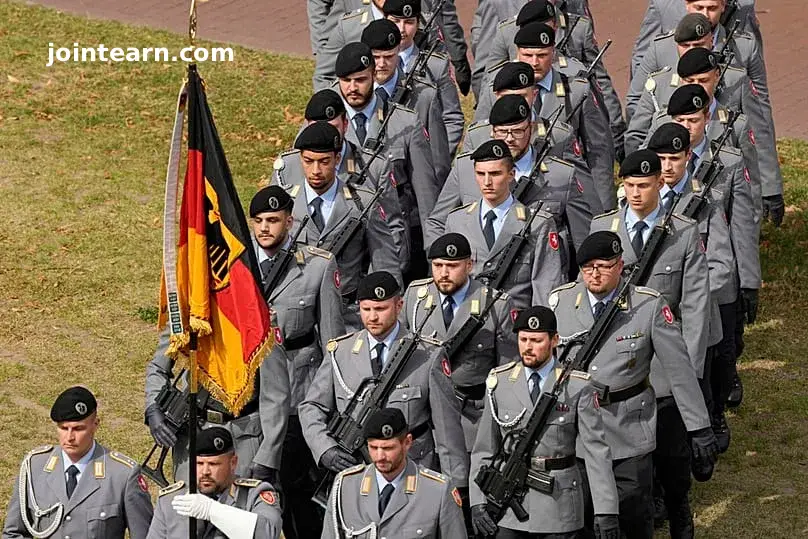
Berlin, November 12, 2025 — Germany is edging closer to a long-awaited agreement on its new military service model, a reform that has sparked intense political debate over the balance between voluntary enlistment and mandatory conscription.
During a visit to Bundeswehr troops in Münster, Federal Defence Minister Boris Pistorius (SPD) hinted that a final decision could come within days, potentially aligning with the 70th anniversary of the Bundeswehr.
“Sometimes it just takes time. Not everything that is presented as a huge dispute ends up being one,” said Pistorius, striking an optimistic tone about a deal within the governing coalition.
Government Pushes Toward Consensus on Military Service
The reform proposal follows the Bundestag’s recent approval of a “New Military Service Law”, designed to attract tens of thousands of new recruits each year and strengthen Germany’s national and alliance defense capabilities.
The proposed law envisions a voluntary military service model, with the possibility of introducing compulsory service in the future if recruitment targets are not met. Pistorius has consistently emphasized that the voluntary system reflects the coalition’s shared position, as outlined in the SPD-CDU-CSU agreement.
Thomas Röwekamp (CDU), chairman of the Defence Committee, confirmed that only a few “details” remain unresolved and that an agreement could be announced this week. However, questions persist over when the plan will be officially unveiled — either during the Bundeswehr anniversary or at the next coalition committee meeting.
What Makes the Military Service Reform Controversial?
According to the draft law, the German Ministry of Defence aims to expand the Bundeswehr to around 460,000 personnel — including 260,000 active soldiers and 200,000 reservists — by 2035.
The ambitious plan comes amid growing security concerns in Europe, particularly in response to Russia’s ongoing aggression and NATO’s renewed focus on defense readiness.
While Pistorius supports a voluntary service framework based on the Swedish model, internal divisions persist:
- SPD Position: Prefers voluntary recruitment supported by national outreach programs and incentives.
- CDU/CSU Position: Advocates a random selection process to avoid recruitment shortages and ensure fairness.
- Compromise Proposal: Compulsory service could be triggered only if voluntary enlistment fails to meet targets.
Pistorius insists that any form of mandatory conscription would be a “last resort,” emphasizing the importance of making the Bundeswehr an attractive career option through improved pay, benefits, and career opportunities.
Expert Warnings: Voluntary Service May Not Be Enough
Despite political optimism, experts remain skeptical about whether voluntary enlistment alone can meet Germany’s defense needs.
Military historian Sönke Neitzel, speaking before the Defence Committee on November 10, warned that the proposed approach may fall short of achieving the Bundeswehr’s personnel goals.
“The draft law is a step in the right direction, but it remains a half-hearted document of hesitation,” Neitzel said. “If Germany is serious about its defense commitments, compulsory conscription is essential.”
Neitzel pointed out that the voluntary model may not provide the rapid personnel increase required to meet NATO standards and national defense objectives.
He argued that relying solely on volunteers would require an annual growth rate of 8,000 new troops, meaning it could take “decades” to achieve full operational readiness.
Political Divide Over Bundeswehr Expansion
The CDU/CSU bloc has called for specific troop-increase targets, arguing that only measurable goals can guarantee accountability.
In contrast, the SPD favors a more flexible approach that focuses first on increasing the Bundeswehr’s appeal to young recruits — through better training, infrastructure, and family-friendly conditions.
Pistorius has proposed a “comprehensive modernization package” to make service more attractive, including enhanced career pathways, improved housing, and support for women in the armed forces.
A Race Against Time: Bundeswehr Reform by 2026
The new law is expected to come into effect on January 1, 2026, setting the stage for a phased implementation. Under current plans:
- Voluntary recruitment will continue throughout 2026 and 2027.
- Mandatory conscription for young men could begin as early as July 2027 or 2028, depending on manpower needs.
- The target increase of 60,000–100,000 soldiers is essential to fulfill NATO obligations and strengthen Germany’s defense posture.
“The Bundeswehr must be fit for war,” Pistorius said, underscoring the urgency of expanding troop numbers and modernizing equipment.
Strategic Urgency and Geopolitical Context
Germany’s renewed focus on national defense comes amid mounting international concerns about European security. Recent government reports warn that Russia could pose a direct threat to NATO within the next decade — intensifying pressure on Berlin to act.
The Bundeswehr’s personnel shortfall remains one of its biggest challenges. As of 2025, the armed forces have roughly 183,000 active soldiers, well below their long-term target.
“The Ministry of Defence assumes the increase can be achieved through voluntary enlistment,” Neitzel added, “but the timeline remains dangerously optimistic.”
The Path Forward
While the debate over military service continues, there is growing consensus across the political spectrum that Germany must rebuild its defense capacity after years of underinvestment.
Pistorius’s efforts reflect a broader shift in German defense policy — one aimed at transforming the Bundeswehr into a modern, combat-ready force capable of defending both national and European interests.
As the 70th anniversary of the Bundeswehr highlights its proud democratic tradition, the question remains: will Germany’s next generation of soldiers come forward voluntarily — or by law?


Leave a Reply